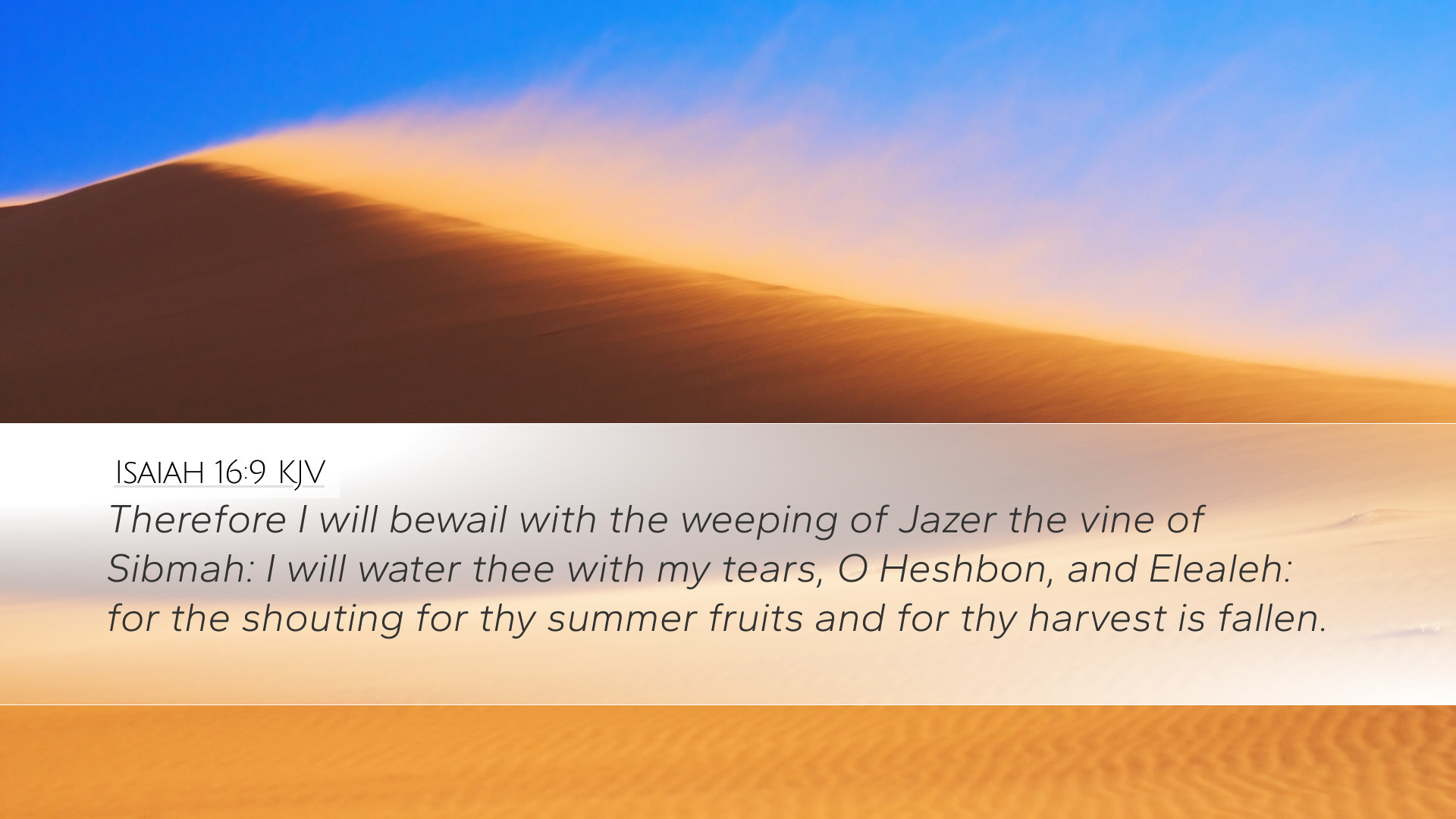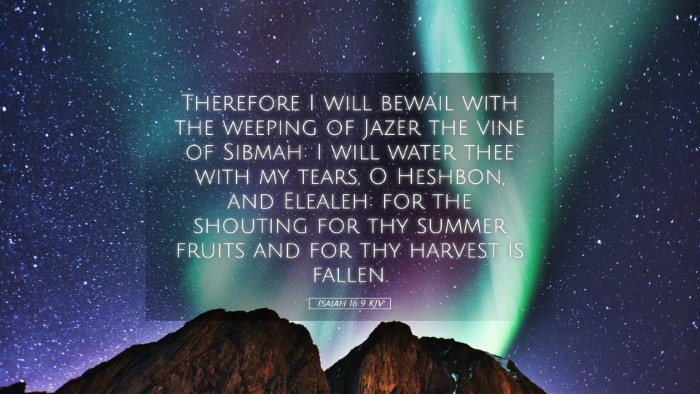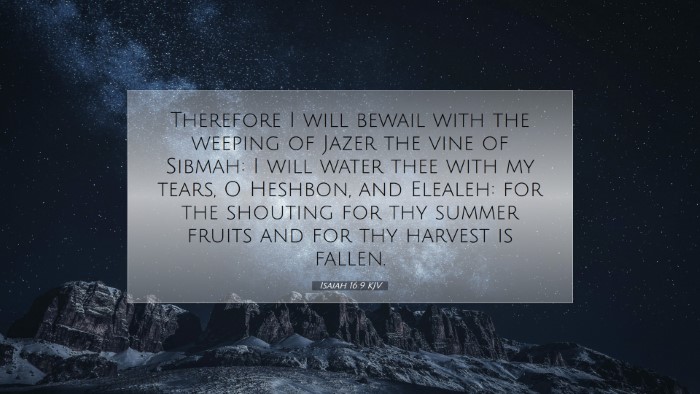Isaiah 16:9 - Commentary and Insights
Isaiah 16:9 states: "Therefore I will weep with the weeping of Jazer, the vine of Sibmah; I will drench you with my tears, O Heshbon and Elealeh; for upon your summer fruits and your harvest the shout has fallen." This verse speaks volumes about the grief and sorrow resulting from the destruction faced by the land and its people. In this commentary, we will explore the depth of emotion expressed in this passage, drawing from the insights of esteemed biblical commentators such as Matthew Henry, Albert Barnes, and Adam Clarke.
Contextual Background
The Book of Isaiah is set against the backdrop of a tumultuous period in Israel's history. Prophet Isaiah addresses not only the nation of Judah but also the surrounding nations, including Moab, which is the subject of Isaiah 16. The emotions expressed in Isaiah 16:9 emerge within the context of prophecy regarding Moab's impending devastation. The prophet's deep sorrow reflects God's perspective on human suffering and divine judgment.
Commentary Insights
Emotional Response and Divine Compassion
Matthew Henry notes that the prophet's determination to weep signifies a profound empathetic response to the suffering of Moab. This is an unusual stance for a prophet who often pronounces judgment. Henry emphasizes that God's compassion penetrates beyond mere judgment, demonstrating a fatherly love that grieves over the pain of His creation.
Albert Barnes also highlights the dual nature of God's response: while He enacts justice upon the nations, He simultaneously feels sorrow for their plight. This reflects the divine character—one that cannot distance itself from the tears of humanity. Barnes draws parallels to other biblical moments where God expresses grief, illustrating that divine retribution is never devoid of an accompanying heartache for His people.
The Lamentation of the Vine
The reference to the vine in this context symbolizes abundance and prosperity, as vineyards are often associated with joy and richness in biblical literature. Adam Clarke notes that Jazer and Sibmah were well-known for their vineyards, and the mention of these locations emphasizes what is lost through destruction. The imagery of the vine weeping illustrates not only the mourning for lost prosperity but also a sense of mourning for the fertility of the land affected by divine judgment.
As we reflect on Clarke's insights, one can surmise that the cry over summer fruits and harvest points to a broader despair over unfulfilled potential and the loss of future blessings. This grief is further amplified when we consider the agricultural society of that time, where harvests were directly related to survival and sustenance.
God's Judgment and Human Suffering
The last part of the verse, "the shout has fallen," carries significant weight in understanding the consequences of sin. Matthew Henry notes that this cry represents not only defeat but also the loud consequences of sin that echo through the valleys of Heshbon and Elealeh. The shouts of joy that were associated with harvest have been replaced with sorrow, illustrating a complete reversal of fortunes.
Barnes further elaborates on this theme by suggesting that the shout signifies both the celebration of harvest and lamentation for what has been lost. This illustrates the effects of sin and wickedness, where the great hopes of prosperity become engulfed in grief. God's acts of judgment serve as a reminder of the consequences of turning away from Him.
Theological Implications
This verse presents profound theological implications, particularly concerning God's nature and His relationship with creation. It challenges the notion of a distant deity, instead presenting a God who weeps with His creation. As leaders, scholars, and theologians engage with this text, they are reminded of the call to draw nearer to God's heart—a heart full of compassion for the lost and the grieving.
Application for Today's Believers
As we meditate on Isaiah 16:9, several applications arise:
-
Empathy Towards Suffering: Believers are called to embody God's compassion, standing alongside those who suffer, whether in their communities or around the world.
-
Recognition of Sin's Consequences: The seriousness of sin must be acknowledged, as it bears consequences not only for individuals but for entire communities.
-
Hope in Restoration: While this verse reflects sorrow, it also presents an opportunity for renewal and redemption, reminding us that through repentance, restoration is possible.
Conclusion
Isaiah 16:9 serves as a poignant reminder of the interplay between divine judgment and human suffering. Through the reflections of Henry, Barnes, and Clarke, we glean insights into God's character—a God who grieves with us in our pain while acknowledging the righteousness of His judgments. For pastors, theologians, and believers alike, this verse calls us to reflect on the weight of judgment while embracing the profound depths of God's compassion, encouraging us to weep with those who weep and to strive toward restoration and hope in our communities.


